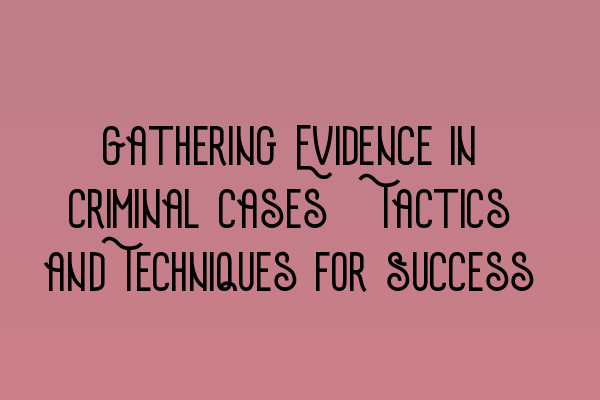Gathering Evidence in Criminal Cases: Tactics and Techniques for Success
Welcome to SQE Criminal Law & Practice Law UK, where our expert solicitors understand the importance of gathering strong evidence in criminal cases. In this blog post, we will explore various tactics and techniques that can help you achieve success in gathering and presenting evidence.
The Importance of Evidence
In any criminal case, evidence plays a crucial role in establishing guilt or innocence. It is essential to gather and present evidence that is admissible, relevant, and reliable. Without proper evidence, a case can be weak and may result in unfavorable outcomes.
Tactics for Gathering Evidence
When gathering evidence in criminal cases, it is important to employ effective tactics to ensure the collection of strong and compelling information. Here are some tactics to consider:
- Interviewing witnesses: It is crucial to interview witnesses as soon as possible to gather their statements. Witness testimonials can provide valuable insights and corroborate or challenge the prosecution’s claims.
- Surveillance: Surveillance techniques can be employed to gather evidence such as photographs, videos, or audio recordings that can help establish the facts of the case.
- Forensic analysis: Utilizing forensic techniques helps in collecting and analyzing physical evidence that can prove or disprove the allegations. Forensic analysis can include DNA testing, fingerprint analysis, and ballistics examination.
- Digital evidence: With the modern world relying heavily on technology, digital evidence is becoming increasingly important. Gathering and analyzing data from electronic devices, social media accounts, or online platforms can provide valuable insights into a case.
- Expert witnesses: In complex cases, expert witnesses can provide specialized knowledge and opinions to support or challenge certain aspects of the case. Their expertise can strengthen your argument and credibility.
- Documentary evidence: Gathering and presenting documentary evidence, such as contracts, invoices, or medical records, can be essential in establishing timelines, proving motives, or demonstrating alibis.
Techniques for Presenting Evidence
Gathering evidence is only half the battle. Presenting it effectively in court is equally important. Here are some techniques for presenting evidence:
- Clear and concise organization: Ensure that your evidence is well-organized and easy to follow. Use clear headings, subheadings, and bullet points to present information in a logical and coherent manner.
- Visual aids: Visual aids such as charts, diagrams, or photographs can help simplify complex information and engage the jury or judge.
- Expert testimony: When presenting complex scientific or technical evidence, having an expert testify can help explain the information clearly and convincingly.
- Relevant anecdotes: Sharing relevant anecdotes or real-life stories can help humanize the evidence and make it more relatable to the judge or jury.
- Confident and professional delivery: Presenting evidence requires confidence and professionalism. Practice your delivery to ensure you are clear, articulate, and persuasive.
Conclusion
Gathering evidence in criminal cases is a critical component of building a strong defense. By employing effective tactics and techniques, you can increase your chances of success in court. Remember, evidence is the key to establishing innocence or casting doubt on the prosecution’s claims.
For more information on preparing for the SQE exams, consider checking out our related articles:
- SQE 1 Practice Exam Questions
- SQE 1 Practice Mocks FLK1 FLK2
- SQE 2 Preparation Courses
- SQE 1 Preparation Courses
- SRA SQE Exam Dates
